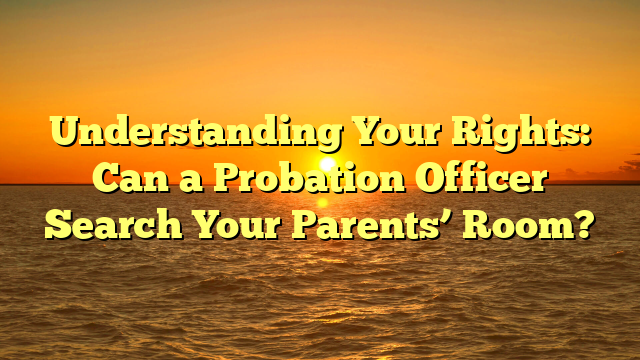Understanding Your Rights: Can a Probation Officer Search Your Parents’ Room?
Introduction
Probation officers play a crucial role in the criminal justice system, ensuring that individuals who have been convicted of a crime adhere to the terms of their probation. However, when it comes to the extent of their authority, questions often arise regarding the boundaries of their search powers. One common concern is whether a probation officer can search a parent’s room during a home visit. In this article, we will explore the rights of probation officers and shed light on whether they have the authority to search your parents’ room.
Understanding Probation
Before delving into the specific rights of probation officers, it is important to have a clear understanding of what probation entails. Probation is a court-ordered alternative to incarceration, allowing individuals to serve their sentence within the community under certain conditions. These conditions may include regular check-ins with a probation officer, drug testing, and restrictions on travel or association.
The Authority of Probation Officers
Probation officers are granted a significant amount of authority to ensure that individuals on probation comply with the terms of their sentence. They have the power to conduct searches of the probationer’s person, residence, and property. This authority is based on the principle that individuals on probation have a reduced expectation of privacy compared to those who are not under supervision.
Searches and the Fourth Amendment
The Fourth Amendment of the United States Constitution protects individuals from unreasonable searches and seizures. However, this protection is not absolute, and certain exceptions apply. One such exception is the search authority granted to probation officers.
When an individual is placed on probation, they are deemed to have consented to searches by their probation officer as a condition of their supervision. This consent is considered voluntary and is a crucial element in justifying the search authority of probation officers.
Scope of Search Authority
While probation officers have the authority to conduct searches, it is important to understand the limitations of their power. The scope of their search authority is generally limited to areas where the probationer has a reasonable expectation of privacy. This means that they can search common areas of the home, such as the living room or kitchen, without a warrant. However, when it comes to searching a parent’s room, the situation becomes more complex.
Parent’s Room: A Gray Area
When it comes to searching a parent’s room, the authority of a probation officer becomes less clear. In general, probation officers do not have the automatic right to search a parent’s room without a warrant. The Fourth Amendment still applies, and the expectation of privacy in a parent’s room is typically higher than in common areas of the home.
However, there are exceptions to this general rule. If the probation officer has reasonable suspicion that evidence of a probation violation or criminal activity is present in the parent’s room, they may be able to obtain a search warrant. Reasonable suspicion requires specific and articulable facts that would lead a reasonable person to believe that a search is necessary.
Protecting Your Rights
If you are concerned about the potential invasion of privacy that may occur during a probation officer’s visit, it is important to be aware of your rights and take steps to protect them.
Know the Terms of Your Probation
Understanding the conditions of your probation is crucial in protecting your rights. Familiarize yourself with the specific terms outlined by the court, including any limitations on searches or restrictions on the authority of your probation officer.
Consult with an Attorney
If you believe that your rights have been violated during a search conducted by a probation officer, it is advisable to consult with an attorney. They can provide guidance on the legality of the search and help you navigate the legal process to address any potential violations.
Document the Search
During a probation officer’s visit, it is important to document the search process. Take notes on what areas of the home were searched and any items that were seized. This documentation can be valuable if you need to challenge the search in court.
Conclusion
While probation officers have significant authority to conduct searches, their power is not unlimited. When it comes to searching a parent’s room, the situation becomes more complex, and the Fourth Amendment protections come into play. Understanding your rights and taking steps to protect them is crucial in ensuring that your privacy is respected during a probation officer’s visit. If you have concerns about a potential violation of your rights, consult with an attorney who can provide guidance and support.
References
1. “Probation and Supervised Release Conditions.” United States Courts, www.uscourts.gov/services-forms/probation-and-pretrial-services/supervised-release-conditions.
2. “Fourth Amendment.” Legal Information Institute, Cornell Law School, www.law.cornell.edu/wex/fourth_amendment.
3. “Probation and Parole Searches.” FindLaw, Thomson Reuters, criminal.findlaw.com/criminal-rights/probation-and-parole-searches.html.
